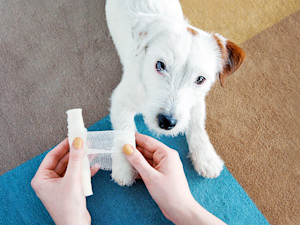Can Dogs Have Calpol?
What works for your toddler isn’t necessarily best for your dog

Share Article
In this article:
Can dogs have Calpol? What is Calpol? Calpol risks Help! My dog had Calpol Calpol poisoning symptoms Calpol alternatives Calpol FAQs
We’ve all been in the position where we think our pup is under the weather or has a twinge or muscle ache, and of course we want to help. Let‘s have a quick look in the cupboard to see if we have anything to hand, Calpol? Would this help? Read on here to see if Calpol is ever given to dogs and the risks associated with this medication.
Can dogs have Calpol?
Dogs can be prescribed Calpol in very specific situations by vets, but before you give your dog Calpol, or any human medication, consult with your vet first as there are times this can be very dangerous to your pet, even life threatening, if not done correctly at the right dose and with the right sort of Calpol.
What is Calpol?
Calpol is an infant and children’s medication containing paracetamol. It comes in a sweet, syrup-like, cough mixture-like formula ideal for giving to children. It also comes in some tablet and gel forms.
Common uses for Calpol in humans
Calpol is a common human medication which is used in infants and children to treat pain and fever. Typical symptoms it aims to relieve in humans are headaches, stomach aches, fevers, ear aches, teething pain, coughs and cold symptoms.
Risks of giving Calpol to dogs
Calpol contains paracetamolopens in new tab, which is used in the veterinary industry and can be prescribed by your vet. The paracetamol dose for your dog has to be specific to the individual and overdose can lead to serious health issues such as liver and kidney failure and death.
There are additional ingredients in Calpol alongside the paracetamol which may also present a danger to your dog. Some formations of Calpol contain a sweetener called xylitol, this is toxic to dogs and can lead to hypoglycaemic shock and can be fatal. Due to these risks, always follow your vet’s guidance and prescription instructions very carefully in order to provide safe treatment.
For those in multi-pet households it’s important to note that paracetamol is extremely toxic to cats and any medications containing paracetamol should never be administered.
What to do if your dog ingests Calpol
If your dog accidentally ingests Calpol, talk to your vet as soon as possible and provide as much detail as you can. In particular: the exact brand and formation of Calpol, the amount ingested, weight of your dog, when it was consumed and if your dog is showing any signs of toxicity (see below). From this, your vet will be able to calculate the risk of toxicity to your dog and next steps of treatment.
Symptoms of Calpol poisoning in dogs
Clinical signs of paracetamol poisoningopens in new tab are lethargy, weakness, fast breathing, pale/blue or brown gums and mucous membranes, vomiting and paw or facial swelling.
Signs of xylitol poisoningopens in new tab from certain Calpols or other human household products can show as weakness, staggering, incoordination, vomiting, collapse, seizures and coma.
If you think your dog may have ingested any human medication including Calpol, or if any of these clinical signs are seen, speak to your vet as soon as possible.
Alternative pain relief options for dogs
The licensed form of medication containing paracetamol for dogs is called Pardale, this is what is usually prescribed by your vet if the pain relief and antipyretic (fever reducing) properties are needed. If anti-inflammatories are more appropriate for pain relief the most common medication prescribed is a Non Steroidal Anti-inflammatory Drug (NSAID) called meloxicam (Metacam, Loxicom, Rheumocam etc.).
But just to add to the risk list: the human NSAID medication ibuprofen is extremely toxic to dogs and should never be given.
Bottom line: can dogs have Calpol?
In some situations yes, but only with guidance and a prescription for your vet.
Dogs and Calpol: frequently asked questions
Can I give my dog aspirin?
No, while it may be prescribed by your vet in very rare situations, aspirin can cause stomach ulcers, seizures, metabolic acidosis (serious electrolyte disorder), kidney failure and coma so it’s best not to risk it.
Is Calpol the same as paracetamol?
Calpol contains paracetamol along with other ingredients to make the sweet syrup more palatable to human children.
Can any form of human pain relief be safe for dogs?
There are some human medications that can be prescribed off license but it has to be under guidance from your vet.
How much Calpol can you give a dog?
Your vet will prescribe the correct dose for your individual dog depending on their need and individual risks.
What happens if my dog has too much Calpol?
Calpol toxicity can be from overdose of paracetamol or ingestion of xylitol which is present in some forms of Calpol.
References
Przybyła, Grzegorz W., et al. “Paracetamol – an Old Drug with New Mechanisms of Actionopens in new tab.” Clinical and Experimental Pharmacology and Physiology, vol. 48, no. 1, Wiley, Aug. 2020, pp. 3–19.
Malinovská, Zuzana, et al. “Poisoning of Dogs by Human Analgesics, Antipyretics and Antiphlogistics.opens in new tab” Folia Veterinaria, vol. 68, no. 4, Sciendo, 2024, pp. 48-53.
Durmuş Hatipoğlu and Okan Kahraman. “Hypoglycemic Shock and Acute Liver Injury in a Dog Associated with Xylitol Toxicityopens in new tab.” Journal of Advances in VetBio Science and Techniques, vol. 6, no. 2, Aug. 2021, pp. 165–70.

Dr Josephine Corrick, BVMSci, BSc, MRCVS
Dr Josephine Corrick, BVMSci, BSc, MRCVS is a veterinary surgeon based in the south of Scotland where she has been since graduating from the University of Surrey. She enjoys working in general practice treating small animals. Her particular interests include diagnostic imaging and the treatment of wildlife.
Having found a passion for veterinary medicine after doing a degree in Equine Sports Science she still enjoys including horses in her life by spending time with her highland ponies. Alongside her clinical work, she helps run a smallholding caring for rare breed sheep and exploring the Scottish countryside with her young Cocker Spaniel.
Related articles
Can I Use Germolene On My Dog? Experts Answer
Just because you use it all the time, doesn’t mean your dog should
![A little white dog gets their leg bandaged up]()
Can I Use Savlon on my Dog? Experts Weigh In
Uh-oh, your pup’s got a cut. How can you stop it getting infected?
![a vet inspects a Beagle puppy]()
How Much Do Puppy Vaccinations Cost in the UK?
Make sure to factor these crucial costs into your puppy budget
Can You Give a Dog Paracetamol?
Don’t reach for the medicine cabinet just yet
![Spaniel holding up paw with white cream on it]()
Can I Put Sudocrem On My Dog?
![a fluffy cockapoo lying on a bed looking sad]()
How Long Can a Dog Be On Metacam?
Understand Metacam usage duration and safety for your dog’s health






